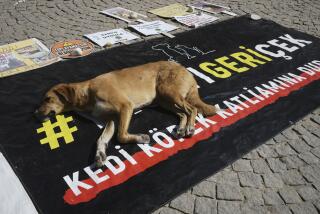Turkish Dogs Come In From Cold
ISTANBUL, Turkey — When Perihan Magden, a popular Turkish novelist, began having trouble with her 11-month-old dog, she didn’t know what to do. A vet told her to give antidepressants to the rebellious pooch. Magden refused. She hired a Ukrainian claiming to be a “canine specialist” -- only to discover that the woman was really a cabaret dancer at an Istanbul nightclub.
Just as Magden was beginning to despair, “I found John, the American,” she wrote recently in her column in the liberal daily newspaper Radikal.
John Adler, a professional dog trainer from Rochester, Minn., has become hot property in this sprawling metropolis of 9 million as a craze for canines sweeps the city. “Business is booming,” said Adler, a wiry 37-year-old, flashing a broad, engaging grin.
Asked whether the recent wave of bomb attacks had given him pause about remaining in Turkey, Adler said: “No way. I am not buying into fear. I am staying.”
Adler, whose clients range from Turkish aristocrats to college students, said he was amazed at his success. That’s because Turkey, though officially secular, is a predominantly Muslim country, and Islamic teachings hold that dogs are unclean. Local municipalities have at times even poisoned strays with strychnine-laced meat.
But attitudes in Turkey are changing, as democracy and a free-market economy take root. Although no statistics are available on the number of dogs kept as pets in Turkey, everyone from veterinarians to government officials has noticed the surging popularity of canines.
Rural Turks have long used dogs for herding. Turkey even has home-grown breeds, among them the Kangal and Anatolian shepherd dog. These enormous, cream-colored creatures, sporting spiked iron collars to ward off wolves, are a common sight in villages across the Anatolian hinterland.
It wasn’t until the early 1990s that pooches began to catch on as household pets. That was when an influx of suitcase traders from the former Soviet Bloc countries began peddling thoroughbred puppies among their wares. At $5 a piece, cocker spaniels, Dalmatians and Great Danes were snapped up not just by elites but by middle-class Turks as well.
In response to their needs, the number of veterinary clinics in Ankara, the capital, has shot up to 100 from about 30 in the last five years.
The increasing popularity of dogs, insisted veterinarian Ates Barut, is “irrefutable proof that we Turks, unlike other Muslims, are fundamentally European in outlook.” He said he also thought the phenomenon was linked to rapid urbanization in this country of 67 million.
“More and more people live on their own in the big cities,” he said, “so just as in New York or London, here too they turn to pets for companionship.”
The country’s largest newspaper, Hurriyet, now devotes a full page in its Saturday edition to pets, offering advice for owners and exposing cases of animal abuse. The page includes an agony column “written” by a dog called Pako, who belongs to Hurriyet political columnist Bekir Coskun.
The column became such a hit that Turkey’s state-run television channel, TRT, has turned it into a regular show that is soon to debut. Pako, a black terrier mix who sports a red bandanna, has the starring role.
Amid pressure from animal rights groups, the government in October approved draft legislation that would make ill treatment of animals a punishable offense. The proposed law, which has to be ratified by parliament, is among a slew of measures tailored to help move Turkey closer to its goal of becoming the European Union’s first predominantly Muslim member.
News that urbane Foreign Minister Abdullah Gul had bought his teenage daughter, Kubra, a golden retriever last year enhanced his popularity among urban, pro-Western Turks. “He’s called Max,” Gul said in a recent interview. “The kids love him.”
Growing demand for pups has driven up prices, but that doesn’t seem to have hurt sales. “We’ve sold four puppies today, including a Shar-Pei for $2,000,” Oktay Guner, a pet shop owner in a swanky Istanbul neighborhood, said one day recently.
The growing popularity of dogs has also created opportunities for the unemployed, with some people turning to walking dogs for a living.
Not everyone sees the upside. Dodging dog poop on the street “is part of my daily routine,” said Mehmet Ocak, a local grocer.
Adler, the dog trainer, is impressed with Turks’ newfound love of dogs but argued that they had a long way to go before “they develop into a dog culture” like the United States.
“Turks come from a civilization of conquerors, who want and like aggressive dogs,” said Adler, who came to Istanbul three years ago to try something new. Frequently, he said, dog owners “ask me to train [the dogs] to attack.”
He refuses. “My No. 1 thing,” he said, “is to improve the quality of the relationship between the owner and the dog.”
More to Read
Sign up for Essential California
The most important California stories and recommendations in your inbox every morning.
You may occasionally receive promotional content from the Los Angeles Times.










